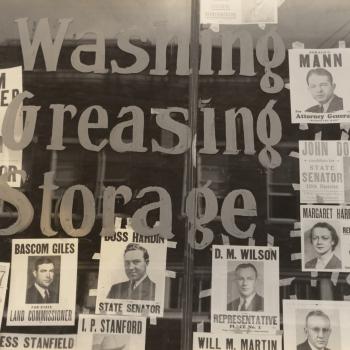 ….according to Owen Strachan of Kern Pastors Network, who recently published a three-part series over on the KPN blog trying to reframe our perspective on a few things. Here are his thoughts:
….according to Owen Strachan of Kern Pastors Network, who recently published a three-part series over on the KPN blog trying to reframe our perspective on a few things. Here are his thoughts:
1) Work is Good.
A fan of “The Office,” Owen notes that in his fandom he may have been taking in a warped attitude:
One thing I think The Office, a show about work, got largely wrong was this, though: work. As the show portrayed it, work is something to endure. Get through. Pass. Not really enjoy. Those devoted to their job, like Dwight, are weird and even creepy. The rest of the cast punches the clock, chips away at their duties, cuts some corners, and generally mopes through the day.
Of course, let’s be perfectly honest: from a Christian perspective, work can be tough, long, and even dreary. Sin affects work, both in our hearts and as a result of unfairness. The Israelites stacking bricks for Pharaoh in the hot sun complained, and did so justly……
But while work is subject to the curse, it’s also given to us by God. Adam did work before he disobeyed God and brought death to us all (see Genesis 2). It certainly looks like we will be active in the new heavens and the new earth after this world passes away.
Owen argues that most of us either tend towards being bored with our job and enduring it as a path to what “really matters,” or becoming obsessed workaholics. Instead, he charges us,
If we adopt biblical categories, we can punch the gas, not the clock. We can build something invigorating…..
Work, we see, isn’t the curse. Working weakly, without a dynamic vision of the God who creates and imagines—that is a curse. The gospel has not saved us from work. The gospel has saved us to work, all so that we can magnify the creativity and greatness of our Creator and Savior.
But that isn’t all, Owen says….
2) Money is Nice
Owen asks us two questions:
1. Have you ever heard of Henry Parsons Crowell?
2. Have you ever eaten Quaker Oats Cereal?…..
Henry Parsons Crowell founded Quaker Oats. Crowell is an unknown guy today, but he was a dynamo in his day. Born to a Christian family in 1855, he overcame tremendous odds as a young man after falling ill with tuberculosis. He eventually bought the defunct Quaker Mill factory in Ravenna, Ohio, and along with it the trade name “Quaker” (though he was not a Quaker, but an evangelical Christian).
Over the next several decades, Crowell applied his business ingenuity to what became “Quaker Oats” cereal. He pioneered the “trial size” cereal box, putting prizes in cereal boxes, and direct marketing to consumers that emphasized the real benefits of the product in an age when your average advertisement for “elixir” promised to end sickness forever. He was a genius marketer, but an honest one.
Interesting story, true, but what’s the point? Owen goes on,
By 1920, the company made $120 million in revenue, in part due to its “Puffed Rice” and “Puffed Wheat” products (that’s well over a billion dollars in today’s currency). In taking a once-dead company to global success, Crowell had become fabulously wealthy, but he defied the way of the world. He had committed his earnings to the Lord and tithed around 70 percent of his earnings in adulthood. A huge portion of his giving went to the Moody Bible Institute, but Crowell didn’t stop there. He helped the school develop its radio ventures and later its renowned aviation program. These were no small contributions—even a century later, WMBI has over 400 affiliates, and it has sent thousands upon thousands of graduates to the mission field, among other places of ministry….
The point is that Henry Parsons Crowell made a lot of money, but he didn’t make it for himself. He genuinely believed that he could serve God by using his entrepreneurial gifts to advance the gospel of Christ’s kingdom. There was a marvelous synergy in his life, in other words. His brilliant marketing wasn’t separate from his simple piety.
 We need to avoid both “prosperity theology” and “poverty theology,” Owen concludes: – making money is good, if you make it ethically and use it as God intends:
We need to avoid both “prosperity theology” and “poverty theology,” Owen concludes: – making money is good, if you make it ethically and use it as God intends:
There’s no exact biblical figure here for New Testament Christians; scholars like D. A. Carson suggest a general principle of sacrificial generosity to our churches, global missions, and needed cultural endeavors. Personally, I think devoting 10 percent of our earnings to our church and global missions is a good starting point, and we could increase that by a percentage point each year if possible.
So give richly, and avoid false guilt. It’s not wrong to spend money. Cars, coats, paved driveways, dark chocolate raisins, and good books can all be good, common-grace gifts of God. Vacations aren’t wrong, provided they’re not what we live for. Treating one’s family well as a provider is a delight. And as a worker, you should feel free to make money aggressively in ethical ways. Be shrewd in your business. Apply all your abilities and talents to work, creativity, and entrepreneurship. Enjoy the life that God has graciously given you.
3) Creativity is Powerful
So, both work and money may not be what we thought they were. But is there even a further point to all this? There is: that Christians should be the most creative people around. Creativity and imagination are inherent in the Christian worldview. We should live like it, and give the lie to the cultural perception that Christians are only about order and control, not creativity and imagination:
Instead of operating in a beaten-down, scared-to-risk, sitting-on-our-hands mentality in which we passively wait for the world to act upon us, we can, like the faithful servants from the Parable of the Talents (Matthew 25:14-30), build a godly vocation and career for God’s glory. This kind of existence is driven by and dedicated to the gospel. Everything we undertake and create is from the outflow of God’s mercy, delivered to us by the body and blood of Jesus.
As pastors, we want members of our congregations to see and savor that God is pleased by their actual work—by figuring stuff out, troubleshooting, analyzing, planning, ordering, structuring, thinking, and making stuff. He is delighted when people work unto him, and when we find pleasure in our vocations. We are merely doing what he does, after all—working and laboring and creating. This applies not only to entrepreneurs or artists, though; it applies to anyone solving assembly-line problems, fixing plumbing issues, untangling math calculations, teaching children new words, cutting hair a new style, figuring out a better base-stealing method, and too many other work responsibilities to count.
How can you be creative in your own life? How can you use your resources for God’s glory? How can you neither reject work nor worship it? These are questions all of us struggle with….comment below! And check out Owen’s book, “Risky Gospel: Abandon Fear and Build Something Awesome”.
Images: “Ferry Gift Shop” by Laura D’Alessandro , “Gifts, Gifts, and More Gifts” by Brandon Watts, and “Create” by Trey Ratcliff, used under a Creative Commons license.













